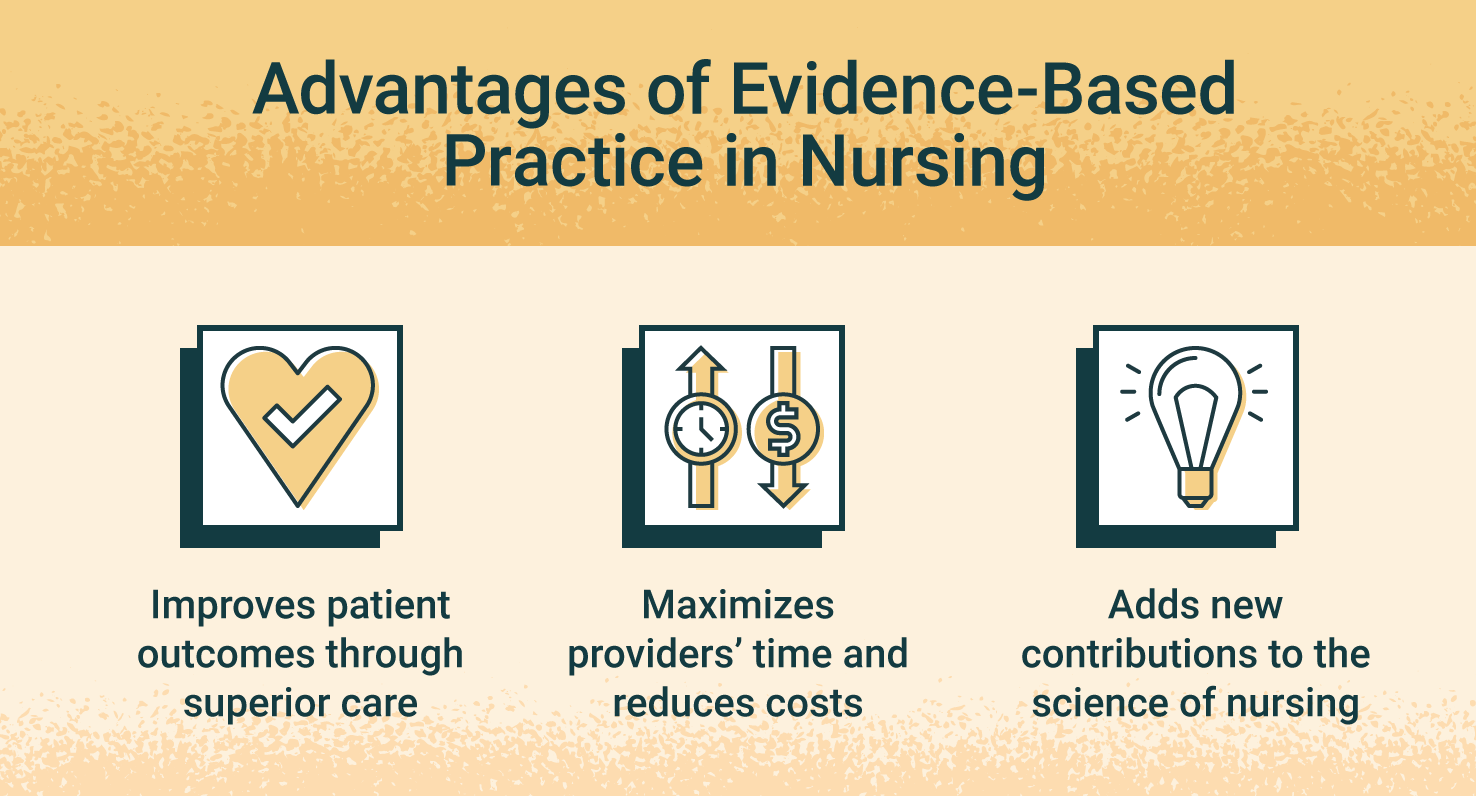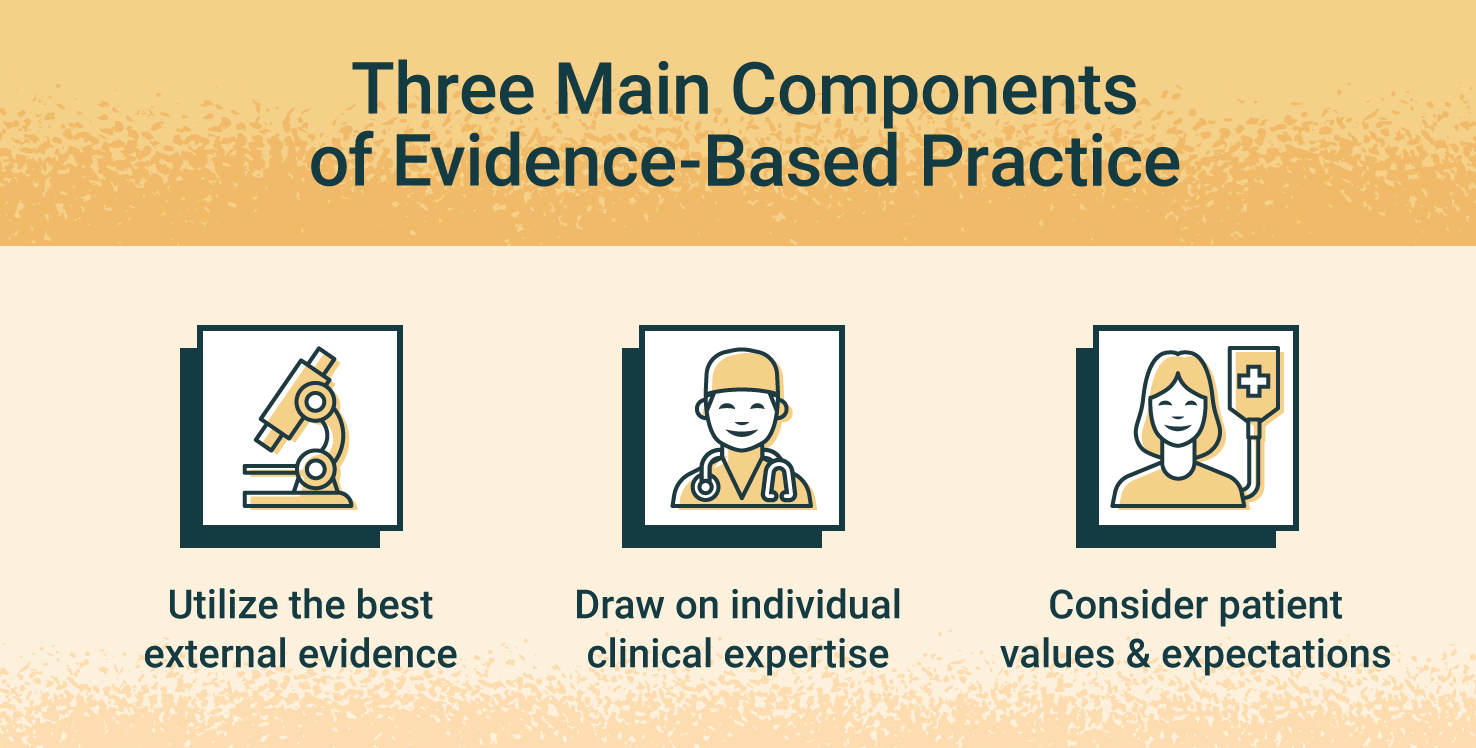Describe Why Using Evidence-based Practices Is Important in Public Health
This article reviews the concepts of evidence-based public health EBPH on which formal discourse originated about a decade ago. Prospective advanced practice registered nurses APRNs such as nurse practitioners and nurse.

Evidence Based Practice In Nursing What S It S Role Usahs
1 It involves translating evidence into practice also known as knowledge translation and ensuring that stakeholders health practitioners patients family and carers are aware of and use research evidence to inform their health and.

. Describe why using evidence-based practices is important in public health. Implement useful findings in clinical practice. Evidence-based practice is now widely recognized as the key to improving healthcare quality and patient outcomes.
Evidence-based public health practice is the development implementation and evaluation of effective programs and policies in public health through application of principles of scientific reasoning including systematic uses of data and information systems and appropriate use of behavioral science theory and. The Community Preventive Services Task Force develops its findings using systematic reviews and information about. Written by Eric Lazar FMS.
Despite the many accomplishments of public health a greater attention to evidence-based approaches is warranted. The practice of evidence-based public health EBPH is an integration of science-based interventions with community preferences for improving population health 1. EBP enables nurses to apply data-backed solutions that incorporate clinical expertise and current research into the decision-making process.
In a Bachelor of Science in Nursing BSN program nurses learn about evidence-based practice EBP which aids them in pinpointing care strategies that can help their patients. Define evidence -based medicine evidence based practice and evidence-based public health EBPH Outline the unique characteristics of EBPH Describe the EBPH Framework Apply key concepts to searching and evaluating the public health literature Identify resources that support best evidence research and practice Objectives. Gordon Guyatt of McMaster University in Canada to the publishing world when it appeared in the Journal of the American Medical Association in 19922.
Registered nurses RN deliver care to patients by applying validated interventions. Based public health practice. The practice of evidence based medicine means integrating individual clinical.
What is Evidence-Based Practice and Why Is It Important. Evidence-based health care practices are accessible for a number of circumstances such as diabetes heart failure kidney failure and asthma. In recent decades EBP has become a key component of exceptional patient care.
The concept of EBPH evolved at the same time as discourse on evidence-based practice in the disciplines of medicine nursing psychology and social work. Connections to health care zBuilding partnerships with public health health care providers hospitals health care systems. The impetus for evidence-based practice comes from payor and healthcare facility pressures for cost containment greater availability of information and greater consumer savvy about treatment and care options.
A collection of evidence-based findings and recommendations about community preventive services programs and policies to improve health and prevent disease within states communities organizations businesses health systems and schools. Decisions informed by evidence result in better health outcomes for individuals and communities. 5 Crosscutting TasksStrategies of Evidence-based Health Promotion Programs continued 3.
Evidence-based practice EBP is the objective balanced and responsible use of current research and the best available data to guide policy and practice decisions such that outcomes for consumers are improved. In this article we outline the need for practice-based evidence tools and strategies that investigators can use to generate practice-based evidence describe approaches to translating practice-based evidence into practice and offer recommendations for making practice-based research the norm in public health. An evidence-based approach to public health could potentially have numerous direct and indirect benefits including access to more and higher-quality information on best practice a higher likelihood of successful prevention programs and policies greater workforce productivity and more efficient use of public and private resources.
Key components of EBPH include making decisions on the basis of the best available scientific evidence using data and. Evidence based medicine is the conscientious explicit and judicious use of current best evidence in making decisions about the care of individual patients. Expertise with the best available external clinical evidence from systematic research Sackett et al 1996.
Evidence based practice refers to all the clinical judgments that are prepared on the basis of investigation and scientific studies which facilitates in the distribution of the high quality care to the patient to make better results. Evidence-based practice EBP is an approach to care that integrates the best available research evidence with clinical expertise and patient values. Mowat says that by making better use of the science that is already there public health professionals can find the most effective ways of preventing unnecessary illness and mortality.
Although the purposes of nursing research conducting research to generate new knowledge and evidence-based nursing practice utilizing best evidence as basis of nursing practice seem quite different an increasing number of research. Evidence-based practice EBP is defined by Duke University Medical Center as the integration of clinical expertise patient values and the best research evidence into the decision-making process for patient care EBP strategies allow nurse practitioners NPs and other health care providers to translate research findings into clinical practice. This policy statement suggests several strategies to mitigate barriers to fully engaging in EBPH and practice-based research including increasing partnerships between academia and public health practice entities facilitating public health agencies access to evidence-based literature and resources improving funding mechanisms to support.
The implementation of evidence-based practice allows nurses to provide quality patient care based on research and knowledge rather than based on traditions myths hunches advice from colleagues or outdated textbooks according to Suzanne C. Evidence-based practice demands changes in education of students more practice-relevant research and closer working relationships between clinicians and researchers. Cultural context zFocusing on the saliency appeal and adaptation to community norms language customs beliefs 4.
Beyea RN PhD and Mary Jo Slattery RN MS in Evidence-Based. Although its roots can be traced back earlier in history1 Evidence-Based Medicine EBM was first introduced by Dr. Evidence-based practice EBP is a crucial tool for delivering high-quality patient care in numerous nursing specialties.

What Is Evidence Based Practice

No comments for "Describe Why Using Evidence-based Practices Is Important in Public Health"
Post a Comment